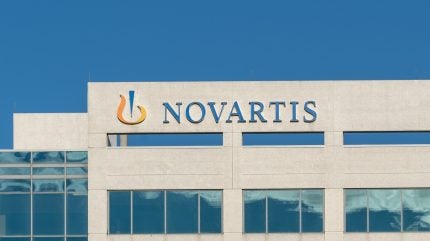
Novartis has received a US Food and Drug Administration (FDA) approval for the label expansion of its peptide receptor radionuclide therapy (PRRT), Lutathera (lutetium Lu 177 dotatate).
The therapy is approved in paediatric patients aged 12 years and older with somatostatin receptor-positive (SSTR+) gastroenteropancreatic neuroendocrine tumours (GEP-NETs). The US FDA first approved Lutathera as a combination therapy with a long-acting octreotide for the same indication in the adult population in 2018.

Discover B2B Marketing That Performs
Combine business intelligence and editorial excellence to reach engaged professionals across 36 leading media platforms.
Lutathera is a peptide receptor radionuclide therapy that uses high-dose radiation to target and destroy cancer cells. Novartis added Lutathera to its portfolio as part of the $3.9bn acquisition of Advanced Accelerator Applications in 2017.
The radionuclide therapy is one of the top 20 brands for Novartis; it generated $169m in sales in Q1 this year, per the company’s financials. Sales for Lutathera are expected to increase to over $879m in 2030, as per GlobalData analysis.
GlobalData is the parent company of Pharmaceutical Technology.
The US FDA approval decision was based on the data from the open-label Phase II NETTER-P trial (NCT04711135). The trial enrolled 11 patients aged 12–18 years with either GEP-NETs or pheochromocytoma and paraganglioma (PPGL), which are neuroendocrine tumours of the adrenal glands and paraganglia, respectively.

US Tariffs are shifting - will you react or anticipate?
Don’t let policy changes catch you off guard. Stay proactive with real-time data and expert analysis.
By GlobalDataNovartis did not disclose the detailed results of the trial but noted that the safety profile was consistent with the results of NETTER-1 study (NCT04954820) that studied adults with this same condition. The company said that the “estimated radiation absorbed dose in paediatric patients was within established organ thresholds for external beam radiation and comparable to that in adults for the approved dose”.
There has been an increased interest in the development of radiopharmaceuticals. Last month, AstraZeneca signed a $2.4bn deal to acquire Fusion Pharmaceuticals, which specialises in radioconjugates. Fusion’s lead candidate, FPI-2265 is a radioconjugate that targets prostate-specific membrane antigen (PSMA). It is being evaluated as a treatment for metastatic castration-resistant prostate cancer (mCRPC) in a Phase II trial (NCT05219500).
Telix Pharmaceutical also expanded its radiopharmaceutical pipeline with the acquisition of QSAM Biosciences. QSAM’s lead candidate, CycloSam (samarium-153-DOTMP), has received an orphan drug designation and rare paediatric disease designation from the US FDA for the treatment of paediatric osteosarcoma.




